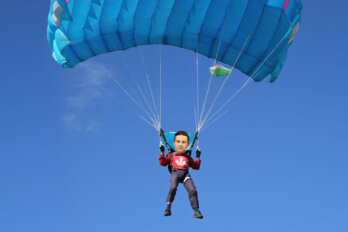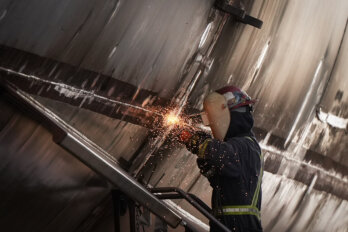It started with a master corporal officer dangling Amy Graham’s underwear in front of five other members of the Canadian Armed Forces (CAF). He had come to her barrack at the Kingston army base with two other officers—one man, one woman—for a routine inspection of the room she shared with three other soldiers-in-training. Their beds were properly made; their clothes ironed and neatly stored; the floors spiffing clean. Graham’s underwear was in a closed cabinet beside her bed.
The officer opened the cabinet, picked up Graham’s private property, and displayed it to the others. He made comments, too—derogatory, sexual comments. His companions didn’t say anything, so Graham, then twenty-two years old and only a couple of weeks into her training, didn’t say anything either. By the time she was posted in Afghanistan four years later, she had experienced many such actions, including another more explicit sexual advance by that same master corporal officer. “You’re surrounded by people that outrank you,” she says, “You’re told to always respect the chain of command, but these things are happening and nobody says anything.”
It was the chain of command that failed to protect Graham at a mandatory stop in Cyprus in the summer of 2010—a chance to decompress for soldiers coming back from war in Afghanistan. Hotel rooms were rented and activities, such as deep fishing expeditions and drinking, were encouraged. Two women and 127 men were on this particular trip, and Graham’s sole female companion switched into a room with her boyfriend. Graham found herself alone in her hotel room, overlooking the Mediterranean Sea. “I already knew I was in a vulnerable situation,” she says. It forced her to be extra cautious—she abstained from most activities.
At 3 a.m. that night, Master Warrant Officer Alan Chapman knocked on Graham’s door with a pillow tucked under his arm. Chapman was Graham’s boss, third in charge of the unit, and he was drunk; he lied and told Graham his roommate was with a girl. She let him enter on the condition that he would sleep on the spare bed. They had all been sharing one tent for the past seven months in Afghanistan; she didn’t think anything of it.
Things escalated quickly. He asked to cuddle first. Then he forcefully entered her bed, grabbed at her, tried to kiss her. She pushed him away; he begged to stay, promising to stop. After smoking a cigarette, he tried again. Graham used all of her power to shove him out the door. With no friends, no means to call anyone, and senior officers all around her—one of whom had just assaulted her—Graham felt completely alone. She eventually reported Chapman’s behaviour to the infantry officer and a senior officer who happened to be Chapman’s roommate. Later that day, Graham saw them talking. Soon after, Chapman approached her with an apology. She refused to hear it.
Graham’s Sergeant-Major told her to press charges when they spoke at the army base. But during the same conversation, he commented on how well a female colleague’s combat pants suited her. “What is the point of bringing any charges forward?” Graham thought at the time. “Nothing would change.” Instead, she kept a police baton near her bed, using it to check every nook of her house before going to sleep—the closets, the basement, behind the furnace, under the bed. At night, shrubs and bushes looked like men. It wasn’t until January 2015—after she left the Forces, suffering from extreme PTSD and major chronic depression—that Graham officially reported the assault to the military police.
Graham is not the first member of the Canadian Armed Forces to have lived a military career tainted with experiences of sexual abuse and harassment—and, unfortunately, she won’t be the last. A 2012 CAF survey found that 56 out of 1705 soldiers (male and female) had experienced sexual harassment, but the Judge Advocate General’s Annual Report, released at the same time, showed that only nine charges had been brought to court-martial that year. Not long after, media investigations into the matter showed that military police received between 134 and 201 complaints of sexual assaults every year since 2000—many of which never resulted in any disciplinary action.
These inconsistencies prompted the creation of an External Review Authority (ERA). Between July and December 2014, Justice Marie Deschamps led a team on a fact-finding mission across a number of military bases across Canada, conducting focus groups and face-to-face interviews with personnel of all levels and ranks. Emma Phillips, legal counsel to the ERA, noted a varied initial response: some officers responded to the statistics with disbelief and skepticism; others claimed the numbers were plain wrong and that sexual assault wasn’t a problem in the CAF; still others said the numbers in reality were much higher and that women were scared to speak up because of possible negative repercussions (being removed from their unit), stigmatization (being labeled as weak or a trouble-maker), retaliation by peers and supervisors, or a diagnosis as “unfit for work.”
The Deschamps report, released two years ago, concluded that “there is an underlying sexualized culture in the CAF that is hostile to women and LGBTQ members, and conducive to more serious incidents of sexual harassment and assault.” Part of the problem is the nature of the CAF organization itself: “It’s an institution that’s a totality,” says Phillips, “because you’re working, living, socializing, all in this one environment.” The CAF is unique in that it has criminal powers to arrest and prosecute its own members. More importantly, the national institution is not at all representative of the country it serves: only 5 percent of the forces are visible minorities, 2.5 percent are Indigenous, and 15 percent are women.
These flaws were addressed by Deschamps with the report’s ten recommendations, which acknowledged a serious problem and counseled senior military leadership to open an independent centre of accountability, and a procedure to ensure its success. The goal, says the report, should be “to eliminate the sexualized environment and to better integrate women.”
Operation Honour, General Jonathan Vance’s mission to “eliminate” any and all inappropriate sexual behaviour, began in August 2015. “I will not allow harmful and inappropriate sexual behaviour within our organization,” says Vance, who is Chief of the CAF Defence Staff, “and I shall hold all leaders in the CAF accountable for failures that permit its continuation.”
The announcement made the CAF the first military institution in the world to deal with sexual assault as an “operation.” Doing so adds a weight that has never before been attributed to the issue. An earlier effort to tackle sexual misconduct—named the Standard for Harassment and Racism Prevention program—failed in 1998 because members didn’t take it seriously and senior leadership didn’t enforce it strictly. The joke “I was SHARP-trained” implied that officers had the licence to act with impunity rather than the opposite. Operation Honour was met with similar sentiments, colloquially rephrased as “Hop on her.” The difference this time is that Vance was dead serious about the consequences of this mocking.
In the months that followed the report, a series of policy changes have been implemented. Leadership programs are constantly being reviewed, updated, and expanded to include educational content about Operation Honour. “Gender advisor positions” have been created to better integrate women in the field. Bystander intervention training has been mandated to all divisions of the armed forces. And most importantly, an independent Sexual Misconduct Response Centre (SMRC) has been established three months ahead of schedule to uphold the CAF’s most important shift in priorities: victim support and advocacy.
In November 2016, the CAF released the first ever Statistics Canada review of sexual misconduct—empirically confirming the anecdotal findings of the Deschamps report. More than 25 percent of female members claimed to have been victims of sexual assault in the past twelve months, half of which indicated that a supervisor or someone of a higher rank was the perpetrator. Among women with fifteen or more years of service in the CAF, almost four in ten reported having been sexually assaulted at least once. Inappropriate verbal or non-verbal communication was by far the most frequent type of behaviour reported, and almost 60 percent of victims didn’t report the incident, afraid of negative consequences or unaware of their options.
“We now have a baseline,” said Vance at the press conference for the report. “Regrettably, it is sobering.” He was livid that cases were still popping up after the launch of Operation Honour.
That same day, Alan Chapman pled guilty to one charge of sexual misconduct against Amy Graham. His admission of fault, his lack of a criminal or disciplinary record, and his thirty of years of service led the court to sentence him to a reduction in rank and a fine of $2,500.
After the sentencing decision, Graham filed a class action lawsuit against the CAF with 200 other men and women, alleging that the Armed Forces have systemically failed to prevent and protect against sexual assault and harassment. “I’ve had my justice in that my case, I went to court and he pled guilty,” says Graham, “but there are so many victims whose case never went to court. I want justice for them as well.”
Why didn’t anyone recognise earlier how deeply embedded the problem was? The Deschamps report suggests it’s because there aren’t enough women in senior positions. “It would make sense if you were putting together an inquiry that had to do with a gendered issue that you would have senior female officers on them,” says Howard Coombs, a part-time army reservist and teacher at the Royal Military College (RMC). “But how many are there to choose from?”
At the moment, barely 15 percent of Canadian officers are women. Grazia Scoppio, an associate professor at the RMC, found similar statistics in Canada’s two military colleges: only 23.7 percent of applicants and 17.4 percent of recruits are female. Half of those recruits end up in support operations; 4 percent go to active combat.
In order to fix this, the CAF has made it a goal to increase female representation by 1 percent every year until it reaches its goal of 25 percent. But Scoppio says the exuberant bro-culture in the military colleges—which tell women to “not be a pussy” and “to find a man, to leave a man, or to become a man”—will make progress difficult. “Girls that come to the army know this is what to expect,” she says.
It’s no surprise, then, that the first commander of Operation Honour—a mission to reclaim the perception of women in the forces—was a fifty-four-year-old woman who was Canada’s first female three-star general and first female chief of military personnel.
“I’d seriously thought that things were better than they had been,” says Lieutenant General Christine Whitecross. For most of last year, she travelled to more than a dozen defence bases and wings across the country to hold town hall events about sexual misconduct. She spoke about the CAF’s duty to respect the dignity of all persons. She answered every question, spoke privately with those who didn’t want to speak to her in public, and responded to every person who wrote to her. She also visited Canada’s military allies—Germany, the United States, Australia, France, and the Netherlands—to better understand the issue of sexual assault in the forces and how best to deal with it.
“When I did the town halls, it hurt me to the core of my being to hear some of the stories,” says Whitecross, who is also a mother of four (one boy, three girls). “Some were very old. Some of them were very recent. But none of them belonged in the Canadian Armed Forces.” The solution won’t be simple, according to Whitecross: it needs to be sustainable, enduring, and comprehensive—from training and education, to policies, to definitions, to disciplinary action.
It’s a feeling that other female leaders like Brigadier-General Jennie Carignan, Canada’s first female combat general, and Colonel Gisele Fontaine, deputy commander of Operation Honour, hope will spread throughout the CAF. Neither of these women nor Whitecross will talk about the problems they faced as women rising in the forces, but they do acknowledge the need for a new reality. “If women move up the ranks,” says Carignan, “victims will start getting support.”
“We have attained a point of no-return in the changes that we want to do,” says Brigadier-General Nicolas Eldoud, Whitecross’s chief of staff. “We are not the institution we want to be.” These countless reports, internal conversations, and initiatives show an increasing realisation that the CAF needs critical mass to sustain any enduring change to its culture.
Graham agrees, but she remains skeptical. Despite the fact that progress reports and monthly statistics summaries are now published online, which could empower others to come forward, Graham feels that the onus is on the victim to report, and there are still too many factors that hinder them. She spoke with many female officers who did not get to fill out the initial StatsCan survey because they were in the reserves, for example, or on leave due to medical reasons—perhaps because of a sexual assault. “The numbers are still not accurate.”
And although the CAF has established the SMRC, which is the first-ever independent support centre for members, Graham calls it a waste of resources. “If you’re not going to report it to your immediate superior, you are not going to go to a centre or call a 1-800 number,” says Graham. “I know I wouldn’t have.”
The day after the Statistics Canada report was released, Whitecross officially assumed command of the NATO Defense College in Rome—an institution that trains senior commanders for multinational work. She is the third Canadian and the first female to take on the role. “If you want to send a message that NATO sees it as important for positions to be filled by female,” says Alain Pellerin, a former chief of staff at the NATO college, “this is the way to do it.” Considering the organisation has never seen a female chief of defense and that its second largest army (Turkey) has never had a female officer, the Whitecross’s appointment is a sea-change, sure to keep the issue of sexual misconduct front and centre.
Whitecross’s initiative at the CAF is already showing progress: according to the latest progress report, released on April 28, only 7.3 of complaints in the past year were deemed unfounded. The CAF also fired seventy-seven officers for sexual misconduct. At last, the forces have put their words into action—and they’re seeing results.
Rear-Admiral Jennifer Bennett, Whitecross’s replacement as commander of Operation Honour, says that a successful operation requires learning lessons and adapting. As such, last month’s report calls for the introduction of additional reporting options for victims. The CAF has also commissioned more targeted surveys for members of the RMC, recruit schools, and regular forces to ensure that sexual misconduct is eliminated at the very onset of a soldier’s career. Soon, an experiential program will also be implemented for women to try out a career in the armed forces before making a decision. This will happen alongside efforts to contact women who have been released in the last five to ten years with a request to reconsider joining the forces again.
Though they’ve been years in the making, the CAF’s anti-sexual-harassment initiatives seem to still be in their infancy. But, as Bennett says, “There is no end date. Changing culture cannot take place in a day.”





